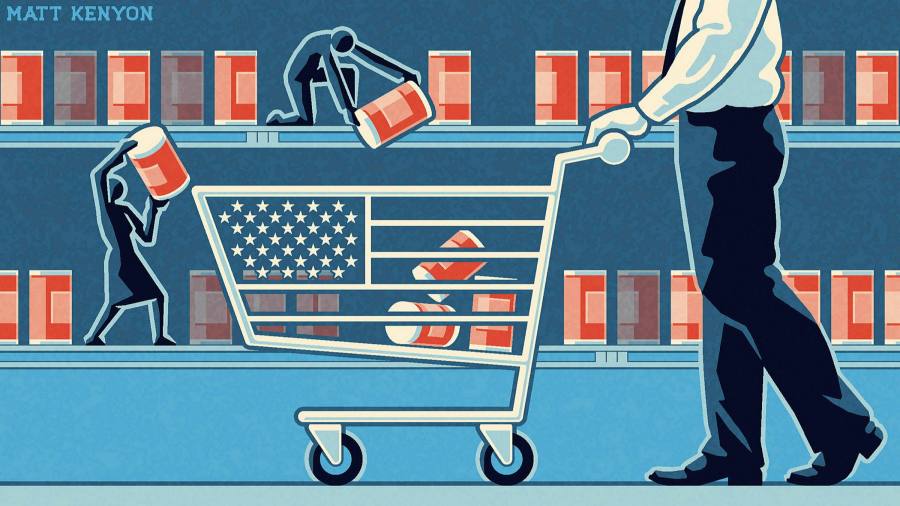[ad_1]
Where you stand depends on where you sit, as Rufus Miles, aide to three US presidents, once put it. It’s an adage about self-interest and perspective that has become known as Miles’ Law. And it’s a phrase worth remembering when thinking about Joe Biden’s push to tighten the “Buy American†requirements in federal procurement contracts.
For labour activists, and some US business people and policymakers, provisions that increase the buying of domestic products look like a no-brainer. Why shouldn’t US taxpayer dollars support US jobs when possible?
But from the perspective of governments in Europe, Canada and other US-allies, it appears that the new administration is just putting a kinder face on Donald Trump’s “Make America Great Againâ€.
It isn’t. As president, Mr Trump talked a lot about the working class but had no real plan to help labour. Mr Biden does. One can argue that his buy-American approach won’t help his purpose; indeed, the Financial Times’s editorial board already has.
But purely economic arguments ignore the political challenges facing the Biden administration, which are arguably greater than Franklin Roosevelt faced in the 1930s. This president has to grapple not only with a raging pandemic but also calls for racial justice, stark class divides, an environmental crisis and — most crucially — a loss of trust in government among swaths of the electorate.
The past five years have made it clear that a big chunk of the American population thinks capitalism and liberal democracy are broken, and the US economy has become oligopolistic. Given the level of US corporate influence and monopoly power, I’d argue they have good reason to.
Over the next 18 months, before the US midterms, Mr Biden has to convince Americans that his administration exists to serve them broadly, not just the 10 per cent of households who own more than 80 per cent of the stock market. If he can’t and the Democrats then lose control of Congress, his ability to achieve much of the rest of his agenda, which includes re-engagement with the rest of the world, will vanish.
Right now, many Americans see recent decades, under both Democratic and Republican administrations, as having been too focused on global rather than local interests. There’s strong evidence to support that conclusion. A recent UN report laid out how the past 30 years of laissez-faire globalisation have disproportionately benefited multinationals and the Chinese state relative to anyone or anything else.
The lower cost of imported goods has not offset the fact that the rising price of other things that define the middle class — education, healthcare and housing — have eaten away at any income growth enjoyed by most households over the past two decades. That, rather than models of Ricardian trade economics — which arguably don’t account for the complexity of Chinese state capitalism or financialised global markets — is the lived reality of swing voters. This US administration has to keep its eyes on both.
US Treasury secretary Janet Yellen, although extremely data driven, has set a terrific tone on that front. In a “day one†message to her staff, she pledged to move beyond textbook economics and stay focused on the “humanity beneath the dataâ€. Interestingly, she also referred to the need to address not only immediate challenges but “an economic crisis that has been building for 50 yearsâ€. It was a nod to decades of falling working-class wages.
The Biden administration is filled with people like Ms Yellen who know that to engage better with the world, the US needs to fix its problems at home.
Nor is the US the only part of the world looking out for itself. Europe’s new trade deal with China may be good for German exporters (as is the contentious Nord Stream gas pipeline project with Russia). But it’s hardly consistent with those high standards in labour and human rights that Europe purportedly supports. It may also make it harder to craft a new transatlantic alliance with the US in areas like digital regulation, something the EU pushed for the minute that Mr Biden took office.
The lack of any real investor dispute resolution in the EU-China trade deal also underscores that Europe isn’t grappling with the “one world, two systems†problem. One good thing the Trump administration did was to acknowledge publicly what many people have thought privately for some time — that current trade patterns and agreements aren’t equipped to deal with the messy economic and political realities of the world today.
In fact, many of the neoliberal rules and structures that currently govern markets were set up in response to the European fascism that emerged early in the 20th century. Policymakers then wanted to connect global capital and business in order to squash nationalism.
Today, by contrast, arguably too much economic globalisation has benefited a select group of stakeholders, and so actually supported political extremism in the US and Europe.
Mr Biden’s “Buy American†plan isn’t some silver bullet solution to the economic woes of this new world. But it is a politically smart nod to the fact that we are in one.
[ad_2]
Source link





